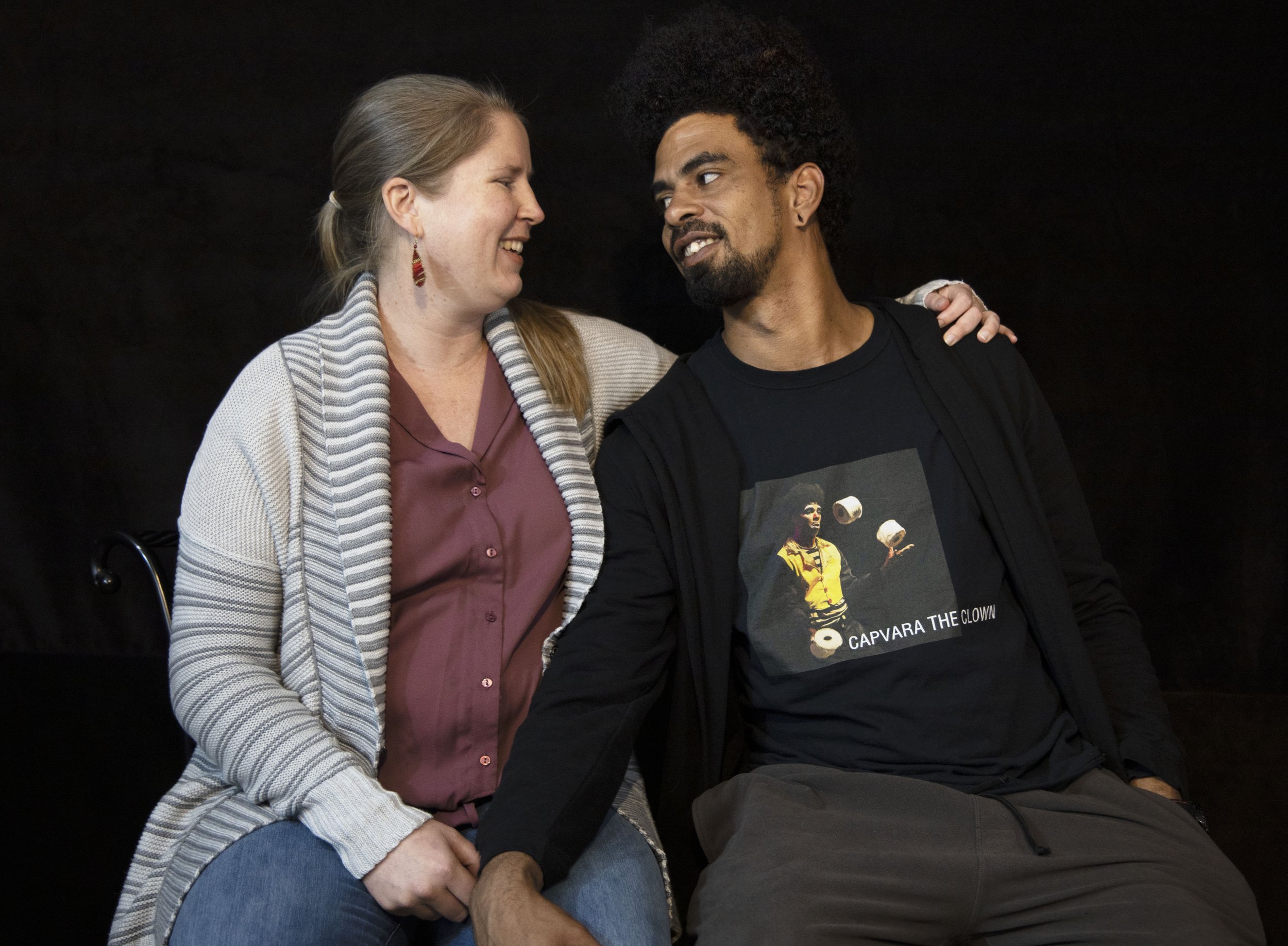Capvara Troupe: More than a show
In a neon yellow striped shirt, high-water pants, comically large shoes and face paint, Jonatas Campelo stops being Jonatas. He is Capvara, a lively clown from a vivid and rich tradition of Latin American street performance.
In downtown State College, where he holds occasional free public shows, young children gasp and exclaim as he tosses knives high into the air and expertly catches them as he juggles.
As he dazzles the crowd with his impressive display of coordination and his animated expressions and movements, his wife, Jamie Lee, slips through the audience, handing out business cards. Above a colorful caricature of the pair, the card reads “Capvara Troupe Bus.”
The couple has only brought their show out in public a handful of times since moving from Jamie’s home state of California in August 2020 for her postdoctoral work at Penn State's Africana Research Center.
Most of their energy is channeled into their daily work: research, grant writing, translating, and podcasting for Jamie, and event setup at the State College Ramada and handyman jobs for Jonatas. But street performance remains their passion and creative outlet of choice.
Before their three years living in California together, the couple lived in Jonatas’ home country of Brazil, where the two met back in 2011 during Jamie’s undergraduate study abroad. Jonatas has consistently lived in Brazil for a majority of their 10-year relationship, either on his own during their periods of long-distance dating or together with Jamie.
While living in the city of Salvador, Brazil's third largest city in the country, Jamie founded an artistic residency supporting artists from similar performance traditions as Jonatas, called Casa de Artes Sustentáveis (House of Sustainable Arts).
But while Jamie is fluent in Portuguese, Jonatas still struggles with English. In part, it is Jonatas’ language barrier that helps him draw in captivated audiences.
While the version of Capvara that performed on the streets of Salvador, was loud and vocal, the State College Capvara is expressive in other ways. Hand gestures, miming, raised eyebrows, playful smiles and moments of planned stillness and silence – through these, Jonatas’ new Capvara is able to express ideas and emotions just as well while retaining audiences in ways he was never able to with his voice.
“I’ve seen him do many shows over two to three years in the United States, and I’ve never ever seen somebody walk away uninterested,” Jamie said of Capvara’s performances.
Watching a performance and seeing the children in the audience “ooh” and “aah,” Jonatas too seems to take on the energy of a child.
Defining the nature of a clown, Jonatas said every clown has this child-like nature. An example of this is Capvara’s signature act, in which he addresses a rubber chicken as his “teacher.”
With Jamie translating from Portuguese, Jonatas explains the act’s significance.
“Going back to when you were a child and you had all these visions of what was possible and you didn’t know what was going to happen in the future and life could be anything — my teacher is this,” Jonatas said.“He rescues this in the performance.”
In a way, his clown persona is his second life. Jonatas said he has almost a spiritual connection to his clown and to his signature act. He said it is his only moment to still be a child while connecting with his act and the audience in a way that gives the child back to them.
This connection is what has always drawn Jonatas to performance and clowning.
Growing up in a simple family in an area that faced many hardships, he said it was difficult for young boys to look to the future with hope. But he said his clown has changed his mentality from this to one of positivity.
“You make a connection with people, it makes you laugh inside and it makes other people laugh,” Jonatas said. “My objective with my clown is this connection with people – this connection is life.”
Although Jonatas and his clown are the name and face of the company, Jamie still has multiple roles within the small troupe.
After meeting and dating Jonatas, she learned to juggle and eventually took up the hula hoop as her own specialty act. She sometimes performs a short, three-minute act in tandem with Jonatas’ set.
Jamie also functions as the troupe’s producer, running behind-the-scenes tasks from sound to the business and financials of the company.
On his own, Jonatas used to struggle with maintaining potential business contacts, finding that the people interested in hiring him and his show seemed to not take him seriously or be willing to pay him as much as they would a white performer. Once Jamie became the face of the business side of Capvara, he found that the two began to retain more business.
“I think having a producer is also just helpful for an artist so they don’t have to sell themselves, but there is this racial component,” Jamie said. “I learned that I could take advantage of my position and be able to help get Jonatas what he deserves.”
Jamie and Jonatas said they hope to continue putting on shows in State College. Their show is available both in person and virtually for hire for events, festivals and parties.
They are expecting their first child in August and said they hope their child will someday take on their love for the circus and performing arts and become a third member of their troupe.
life lessons from a rubber chicken
Jonatas Campelo, aka Capvara the clown, talks about his signature act, entitled "This Is My Teacher," where he learns lessons on creativity and imagination with the help of his rubber chicken "teacher."





